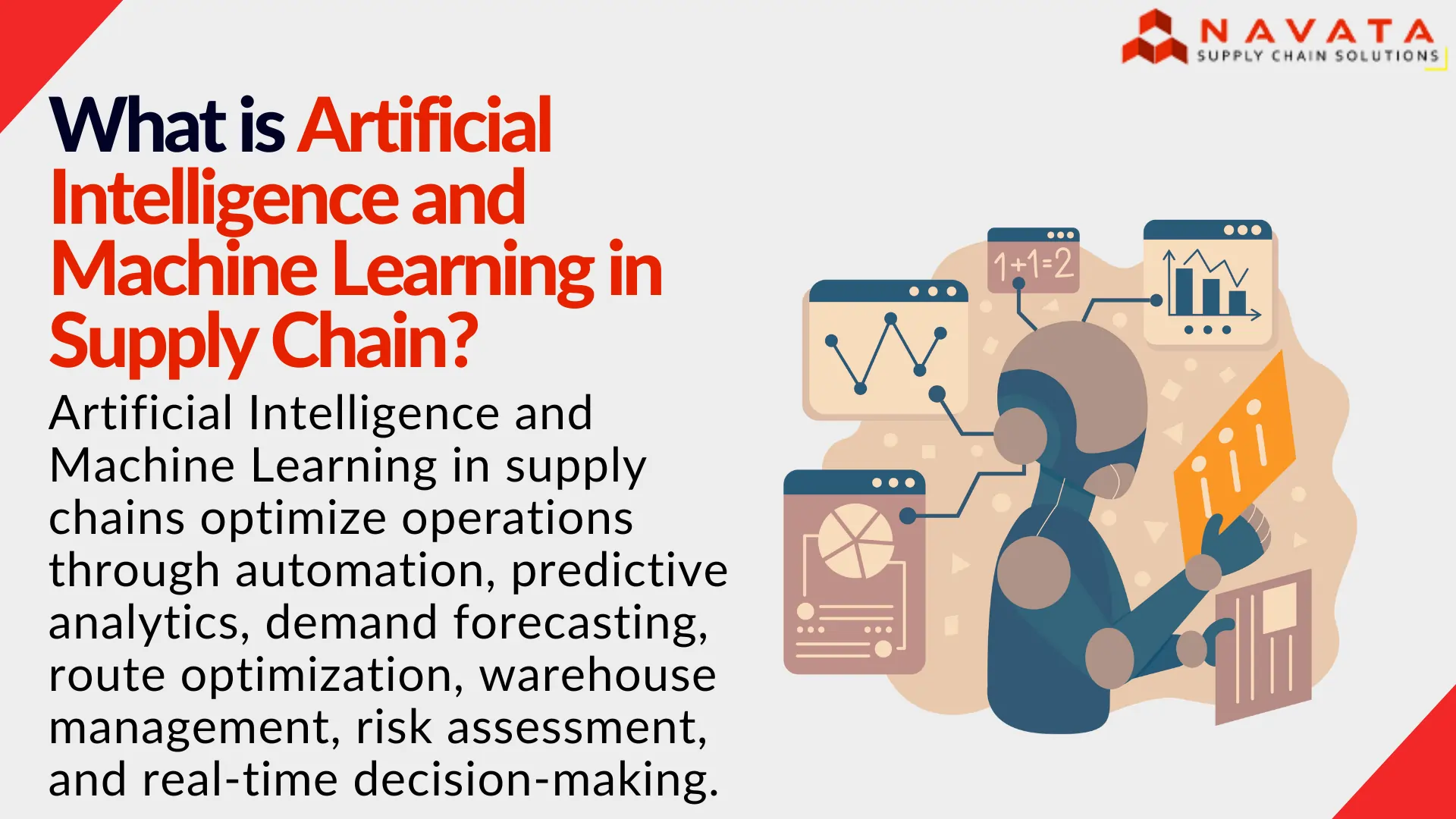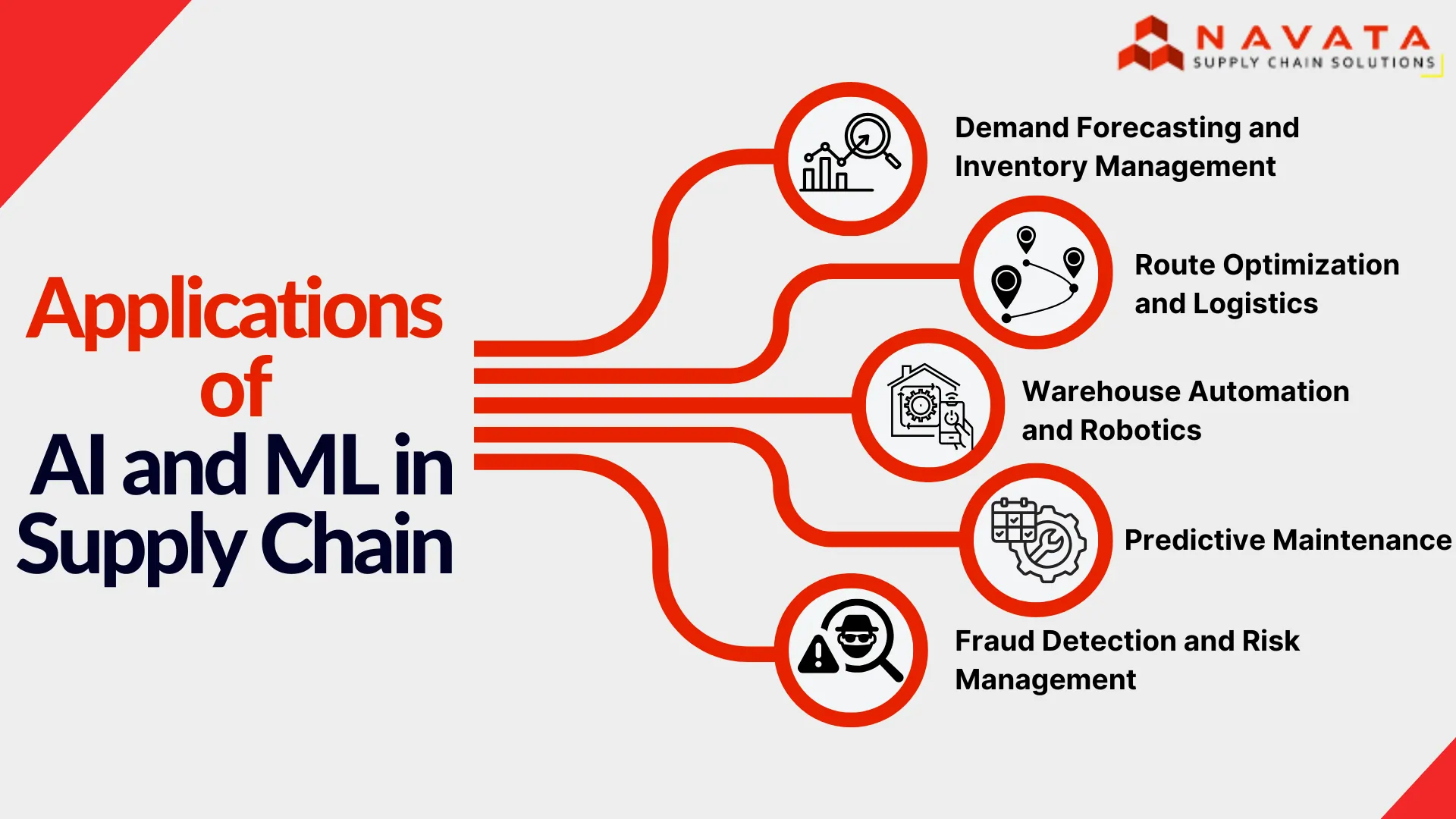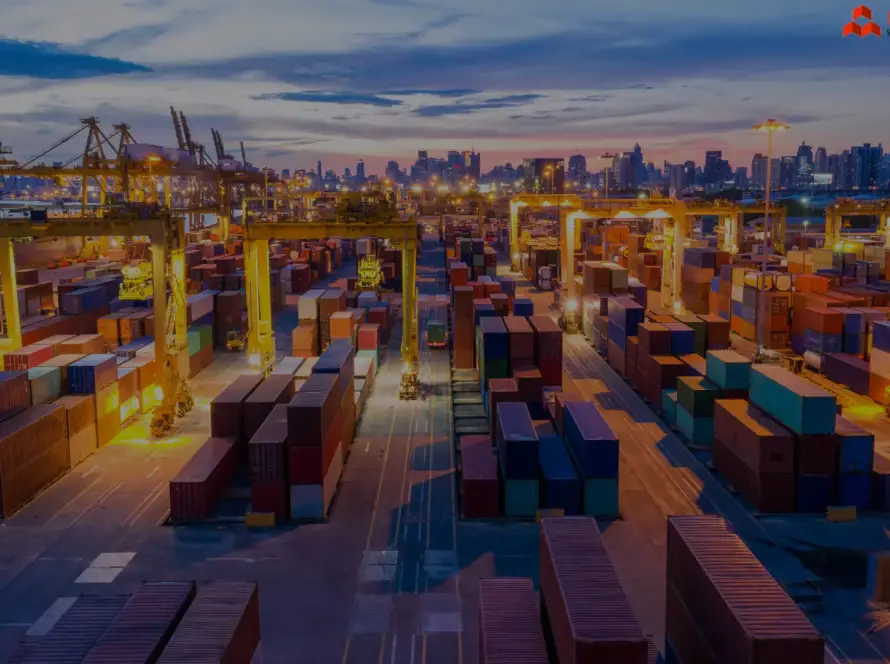Artificial Intelligence and Machine Learning in Supply Chain
Modern supply chains operating with Artificial Intelligence and Machine Learning have transformed standard operations into computerized data-based systems. These technological solutions let businesses make their logistic operations more efficient and deliver better forecasting results alongside optimized decision-making capabilities.
The supply chain utilizes AI and ML to enhance operational speed and decrease mistakes while simultaneously lowering expenses throughout the chain. The technologies enable businesses to achieve swift adaptation through their functionalities, which include demand forecasting as well as warehouse automation to handle market variations and customer requirements.
Organizations utilize artificial intelligence along with machine learning to gain business advantage through better supply chain visibility, risk reduction and elevation of supply chain strength. Real-time data analysis and predictive insights together with automation enable businesses to enhance productivity as well as achieve operational superiority.

What is Artificial Intelligence in Supply Chain?
Artificial Intelligence (AI) in supply chain management refers to the integration of intelligent algorithms and automation to streamline logistics, enhance efficiency, and support data-driven decision-making. AI enables supply chain systems to process vast amounts of information, recognize patterns, and optimize operations with minimal human intervention.
Key AI Applications in Supply Chain:
Predictive Analytics – AI analyzes historical and real-time data to predict demand fluctuations, allowing businesses to optimize inventory levels, minimize waste, and avoid stock shortages or overstocking.
Automation – AI-powered robotics in logistics and autonomous systems are transforming warehouse management, improving speed and accuracy in order processing, sorting, and packaging.
Route Optimization – AI-driven logistics platforms evaluate traffic, weather, and delivery schedules to recommend the fastest and most fuel-efficient transportation routes.
Chatbots & Virtual Assistants – AI enhances customer service by using chatbots to provide real-time updates on order tracking and handling inquiries efficiently.
Supplier Risk Management – AI algorithms assess supplier reliability, economic conditions, and geopolitical risks to minimize disruptions in the supply chain.
You May Also Like to Read: What Is Supply Chain Analytics?
What is Machine Learning in Supply Chain?
Machine Learning (ML) in supply chain management involves the use of data-driven algorithms that learn from historical trends to enhance operational efficiency and accuracy. Unlike traditional rule-based systems, ML continuously adapts and improves based on new data insights.
Common ML Use Cases in Supply Chain:
Demand Forecasting – ML analyzes sales trends, seasonal patterns, and external factors (like economic shifts) to accurately predict future demand, helping businesses plan inventory more efficiently.
Anomaly Detection – ML identifies irregularities in supply chain operations, such as unexpected delays, fraud, or quality defects, enabling businesses to take proactive corrective actions.
Warehouse Optimization – ML-powered algorithms streamline warehouse space utilization, ensuring efficient storage and faster picking and packing processes.
Dynamic Pricing Models – ML helps companies adjust pricing strategies based on market trends, competitor pricing, and customer purchasing behavior.
Fleet Management – ML optimizes delivery schedules by analyzing real-time traffic data, fuel efficiency, and vehicle maintenance needs, reducing operational costs.
You May Also Like to Read: What Is Green Supply Chain Management & It’s Effects
Key Applications of AI and ML in Supply Chain
Demand Forecasting and Inventory Management
AI-driven demand forecasting models analyze real-time and historical data to predict sales trends accurately, reducing stockouts and overstocking. ML algorithms continuously improve forecasts by identifying seasonal patterns, economic shifts, and market changes. This enhances inventory management, ensuring optimal stock levels while minimizing waste and operational costs.
Route Optimization and Logistics
AI-powered route planning tools use real-time traffic updates, weather conditions, and delivery schedules to optimize transportation routes. This improves fuel efficiency and ensures timely deliveries. ML algorithms refine logistics planning by learning from past delays and disruptions, enabling companies to reduce transportation costs while improving delivery accuracy and supply chain resilience.
Warehouse Automation and Robotics
AI-driven robots streamline warehouse operations by automating picking, packing, and sorting processes, significantly increasing efficiency and accuracy. ML algorithms analyze order patterns to optimize warehouse layouts, reducing travel time for workers and enhancing productivity. This minimizes manual errors, improves order fulfillment speed, and reduces overall warehouse management costs.
Predictive Maintenance
AI-powered sensors continuously monitor equipment health, detecting early signs of wear and preventing unexpected breakdowns. ML models analyze historical maintenance data to predict potential failures, allowing businesses to schedule proactive maintenance. This approach minimizes downtime, extends equipment lifespan, and reduces repair costs, ensuring smooth supply chain operations without disruptions.
Fraud Detection and Risk Management
AI analyzes supply chain transactions in real time to detect anomalies, unauthorized activities, and potential fraud. ML models assess supplier reliability, procurement risks, and market fluctuations to mitigate disruptions. By identifying suspicious patterns early, businesses can take preventive measures, safeguard financial assets, and maintain transparency in supply chain operations.

Challenges of Implementing AI and ML in Supply Chain
High Implementation Costs
Integrating AI and ML into supply chain operations requires substantial investment in advanced infrastructure, software, and skilled professionals. Companies need to allocate funds for AI-powered platforms, data storage, cloud computing, and continuous training. The high upfront costs may be a barrier, especially for small and mid-sized enterprises.
Data Privacy and Security Concerns
AI-driven supply chains handle vast amounts of sensitive data, including customer information, financial transactions, and supplier details. Ensuring data security against cyber threats and unauthorized access is a major challenge. Companies must invest in robust encryption, compliance with data regulations, and continuous monitoring to prevent data breaches.
Integration with Legacy Systems
Many supply chains still rely on outdated software and infrastructure, making AI integration complex. Legacy systems may lack compatibility with AI-driven solutions, requiring costly upgrades or replacements. Ensuring seamless communication between traditional supply chain management tools and AI-powered analytics requires time, resources, and skilled IT support.
You May Also Like to Read: What is IoT and how it is Shaping Supply Chain & Logistics
Future of AI and ML in Supply Chain
The future of AI and machine learning in supply chain management promises transformational advances. AI-powered autonomous supply chains will allow for real-time, data-driven decision-making, decreasing human interference while increasing efficiency. Generative AI will improve predictive modeling, allowing firms to forecast demand swings and optimize operations more accurately.
Automation, backed by AI and machine learning, will streamline logistics, inventory management, and procurement, lowering inefficiencies and operational expenses. As AI technology advances, its integration into global supply chains will improve resilience, sustainability, and agility, allowing firms to respond to shocks and market shifts more effectively in the coming years.

Conclusion
Artificial intelligence and machine learning have transformed supply chain management by improving efficiency, accuracy, and decision-making. These technologies help operations in a variety of ways, including demand forecasting, warehouse automation, route optimization, and fraud detection. Despite hurdles such as high installation costs, data security issues, and legacy system integration, organizations are increasingly turning to AI-powered solutions to remain competitive.
The future of AI in supply chains offers more automation, real-time analytics, and predictive intelligence, allowing businesses to streamline operations, decrease risks, and improve customer happiness. AI and machine learning will play an increasingly important role in constructing smarter, more agile supply networks as they evolve.
Thanks For Reading: Role of Artificial Intelligence and Machine Learning in Supply Chain
Powered By 360Presence

